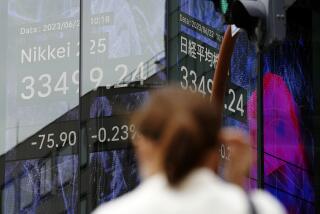Europeans Hike Interest Rates but Dollar Still Closes Higher
- Share via
WASHINGTON — Central banks of the major Western European nations, dropping the other shoe in their effort to stem the six-month-long rise in the value of the dollar, boosted their key interest rates Thursday, some by as much as a full percentage point.
But it remained to be seen whether the move--a coordinated effort begun by the West German Bundesbank--would cause much more than a short-lived thud. The dollar fell initially on international currency markets but then rebounded and closed higher for the day.
Although the Europeans insisted publicly that they had raised interest rates mainly to help combat inflation at home, the move was also intended to cap the soaring dollar. A rising dollar--which lowers the relative value of European currencies--intensifies inflation pressures there.
It was only two weeks ago that finance ministers and central bankers of the United States and its six major economic allies pledged to “cooperate closely” by selling dollars in the currency markets to help slow the dollar’s rise.
While that effort was successful initially, there was widespread speculation that the central bankers eventually would have to adjust interest rates to keep the dollar stable. A rise in rates overseas helps keep demand for dollars low by luring investors abroad.
That speculation was fulfilled by Thursday’s round of interest rate hikes in Europe. But there were some qualifiers.
For one thing, the Bank of Japan and the U.S. Federal Reserve Bank conspicuously did not participate in the interest rate moves. Analysts said the Fed, which ordinarily would have reduced U.S. interest rates if it intended to complement the Europeans’ moves, is fearful of exacerbating inflation here.
Second, the effort seemed effective only temporarily. Although the dollar fell rapidly at first in Europe and the United States, it stabilized in the New York foreign exchange markets and then edged up to close slightly higher by the end of the trading day.
By the end of trading in New York, the dollar was selling at 1.89 West German marks, up from 1.88, and 142.55 Japanese yen, up from Wednesday’s 141.47.
The Bush Administration had been eager to cap the dollar’s rise for fear that too high a dollar might erode the competitiveness of American exports. A senior Treasury official, speaking on condition that he not be identified, told reporters after Thursday’s dollar slide and rebound that “we’ll just have to wait and see” what the greenback does from now on.
The interest rate hikes announced by West Germany amounted to a full one percentage point. The Bundesbank, acting on two of the interest rates that govern major transactions between financial institutions, boosted its discount rate to 6% and its Lombard rate to 8%.
Still a ‘Safe Haven’
That action was followed almost immediately in London, where the Bank of England raised its base lending rate from 14% to 15%, its highest level since November, 1981. France then raised its rates by three-quarters of a percentage point, and Switzerland and others soon followed suit.
Analysts were skeptical about how effective the new moves would be in capping the rise of the dollar, which stands near the top of the ranges set by the finance ministers of the seven major industrial democracies. They said the greenback is strong because the United States remains a “safe haven” for international investment.
Economists also warned that even if the interest rate increases succeed in stemming the rise of the dollar, the move could backfire on Washington and effectively export some of Europe’s inflation to the United States.
Although a lower dollar ostensibly makes U.S. exports more attractive to foreigners, it also raises the price of imports here at home and gives American manufacturers more leeway to raise the prices of domestic goods.
Intervention Failed
Jerry Jordan, an economist at First Interstate Bancorp in Los Angeles, also cautioned that the coordination effort by the seven industrial democracies might prove a waste of money unless fundamental economic policies are changed. “To my mind, it’s a whole lot of foolishness,” he said.
Thursday’s action followed a week and a half of heavy intervention by the Federal Reserve and other central banks in the foreign exchange markets trying to counter the rise in the value of the dollar.
But Thursday’s move, particularly the rate hike announced by West Germany, was not entirely designed to influence the dollar. Bundesbank President Karl Otto Poehl had been warning for weeks that West German inflation, about 3% a year, was beginning to become worrisome.
With domestic capacity already stretched to the limit and the economy likely to be spurred further by a flood of immigrants from Eastern Europe and an impending tax cut, the Bundesbank had been worried that inflation might get out of hand.
More to Read
Inside the business of entertainment
The Wide Shot brings you news, analysis and insights on everything from streaming wars to production — and what it all means for the future.
You may occasionally receive promotional content from the Los Angeles Times.










